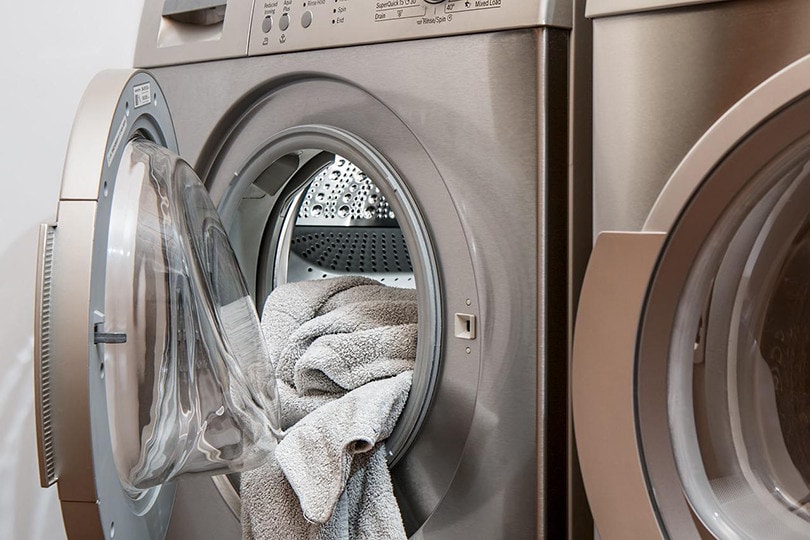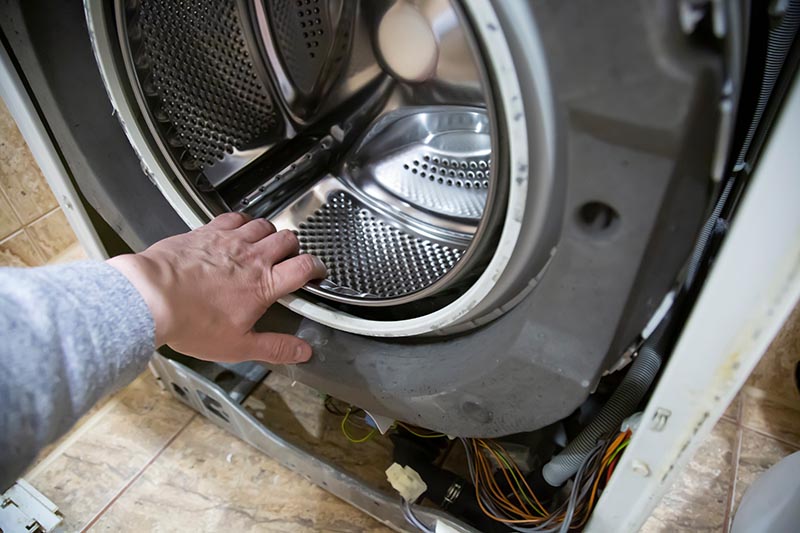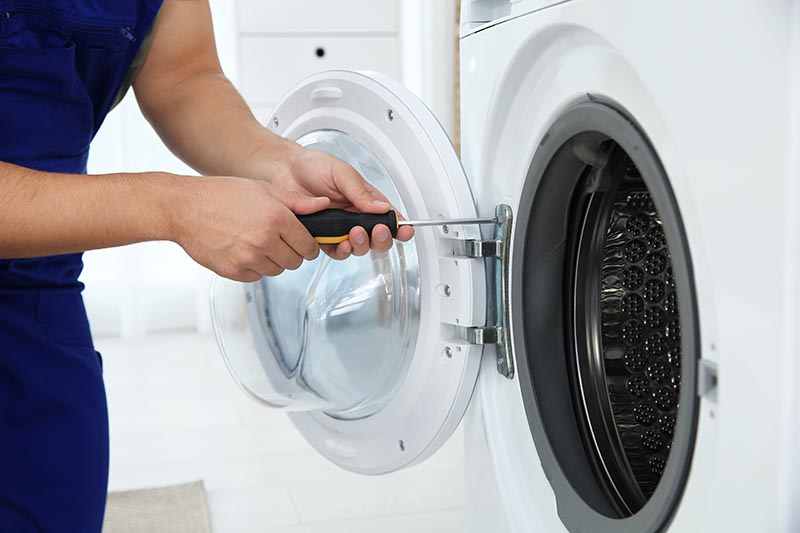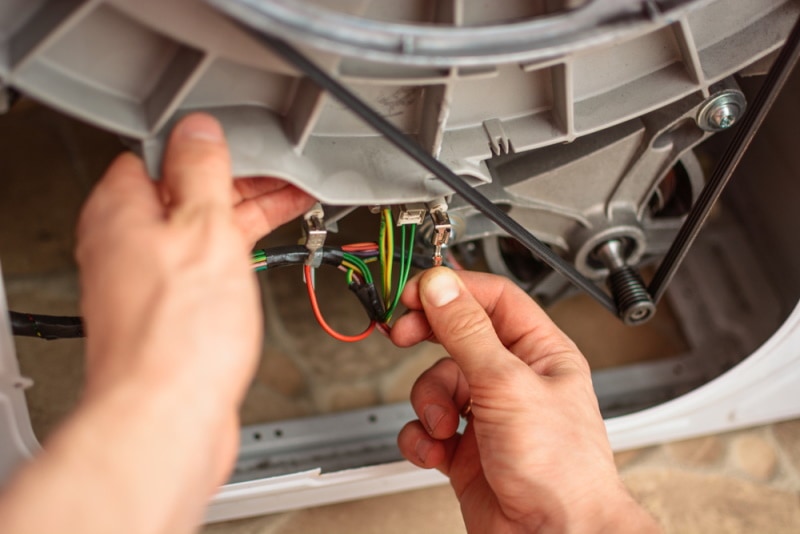Can You Convert a Gas Dryer to Electric? Reasons, Differences, & FAQ
-
- Last updated:

The question of whether a gas dryer can be converted into an electric dryer has become common among homeowners. As odd as it may sound, some people prefer switching to electric appliances. If you are one of them, this article has a fulfilling answer for you. It is possible, but there are some caveats.
In the sections that follow, we expand on the differences in the physical and operational structures of both gas and electric dryers to understand whether we can convert them or not. We also focus on the pros and cons of converting them to find out if it’s worth it. Keep reading to learn more.

Key Differences Between Gas and Electric Dryers
Before going into the details, let’s explore the major differences that make it quite difficult to convert gas dryers to electric.
Without a doubt, the most notable difference between gas-powered and electric dryers is their source of power. Whereas electric dryers use electricity to create heat¹, gas dryers are powered by either propane or natural gas.
Another major difference is apparent in their energy efficiency. Gas dryers consume less energy while drying laundry more quickly. On the other hand, electric dryers use twice as much energy and time to dry a similar amount of load.
The last key difference is their market cost. Because gas dryers are more energy efficient and fast, they tend to cost more than electric dryers. Their basic components also cost more, that’s why you’ll have to pay an extra $50–$100 to purchase them.

Differences in Installation Techniques
Unlike their gas-powered counterparts, electric dryers are quite simple to install. All you need to do after purchasing it is to transport it and plug its power cable into a 240-volt socket in your laundry room.
However, you must know that typical power outlets don’t supply as much as 240-volt power. For this reason, it’s a good idea to have a professional appliance technician install the dryer for you. They should be able to link the power outlet with breakers in the main box to double the power output from 110 volts to 240 volts. Alternatively, you can opt for portable and compatible dryers¹ if you want to save on electricity. They can run on 110 volts only but are, unfortunately, more expensive.
On the contrary, gas dryers are expensive to install because you’ll have to pay a gas supply company to connect your home with an underground gas line. Fortunately, some kits can let you use propane on dryers powered by natural gas. But since installing them requires extreme caution, it’s recommended that you get a reputable technician to fix it.
Differences in Venting Systems
Both electric and gas dryers must be vented to expel harmful emissions coming from the dryer. If such debris is allowed to blow into your house, it would not only stain the walls and curtains but also pose a great risk to your health.
It’s worth knowing that one of the wastes of a gas dryer is carbon monoxide. It is colorless, odorless, and poisonous, meaning it’s highly hazardous. That’s why it should be vented to the outdoors where it will dissipate into the atmosphere.
If you are wondering why electric dryers need to be vented yet their systems don’t burn carbon, it’s to expel the resulting hot moisture.

The Difference in the Working Principle
In both setups, the appliance uses a similar system of air, heat, and tumbling to dry wet clothes.
While a gas dryer uses a gas burner to heat the air, an electric dryer uses a heating element¹ that works like the heating coil. Water will evaporate through the vent pipe when the temperatures become high enough. Meanwhile, the clothes will keep drying as they are tumbled.
Their gas counterparts depend on burning either propane or natural gas to produce the heat for drying. When the igniter is triggered, the resulting flame burns the gas until it’s hot, after which it is pushed by a blower into the drum unit.

Is Converting a Gas Dryer to Electric Worthwhile?
While it is possible to convert your gas dryer into an electric one, the whole venture is risky and not always worth it for several reasons:

1. There Are No Tutorials
Experts understand how risky it is to convert gas dryers into electric dryers. For this reason, you’ll barely find any online tutorial that guides you on how it’s done. Unless you have considerable knowledge of how electric currents work, how to do the wiring, and how the appliance operates, you shouldn’t attempt converting them or you may risk damaging the entire setup.
2. It Is Expensive
Why should you remodel a cheaper dryer into a more expensive one? It’s unnecessary because, besides increasing your burden on the electric costs, you’ll be forced to spend a lot of money in the conversion process.
Remember, you’ll have to purchase new internal parts, vent pipes, burner tubes, and other crucial components. It’s safe to say that your bank account may never forgive you for making such a move.
Also, since the running cost of maintaining electric dryers is more than that of gas dryers (remember they aren’t as energy-efficient), you should expect to pay a higher electricity bill every month.

3. Both Types Operate on Different Electrical Currents
Whereas gas dryers operate on a 110-volt current, electric dryers run on high-duty currents of 240 volts. If you intend to convert a gas dryer to electric, you must be ready to modify the wiring system from 110 volts to 240 volts. We can’t stress enough how much harm an improperly wired circuit poses. So, ensure you contact a professional to do it.

What Should You Do Instead?
Now that we’ve figured out why it is unnecessary to convert a gas dryer, we are presented with a problem: what should we do instead? Well, you can simply buy another dryer.
Instead of converting your gas dryer into an electric one, it’s better to spend the money you’d use for the re-installation to purchase a new electric dryer.
Another alternative is to trade the gas dryer with an electric one. They are more expensive, meaning you can sell them second-hand, buy an electric dryer, and be left with some profit.

How to Convert Gas Dryer into Electric Dryer
Perhaps you have some knowledge and experience in handling electricity and home appliances, and you want a rough guide for completing a gas-to-electric dryer conversion. If that’s the case, then this section has you covered.
First, you need to purchase the relevant parts to be fixed¹. For instance, the drive motor, burner tubes, drum lamp, control board, thermometers, venting pipes, and other parts must be removed and replaced with new, compatible ones.
The next step is to remove all these parts and add the electric components. You should remain with only a skeleton of the dryer and a few features. After you’ve demolished every unnecessary thing, it’s time to install the 240-volt, single-phase circuit. Ensure you cap the gas line to prevent leaks.
Finally, you’ll have to change the components by replacing the wiring, controls, and heating assembly. If there are any sensors or other components that need replacing, ensure you substitute them carefully and perfectly.

Conclusion
After reading this article, it’s evident that you can convert a gas dryer into an electric one. Being a risky procedure, you can only do it if you have basic knowledge of how dryers work and some experience in handling electricity-related appliances.
However, from a financial and safety point of view, converting a gas dryer to an electric one isn’t worth it. You should purchase a new electric dryer instead. Still, if you are set on making the switch, it is best to hire a professional to complete the project.
- https://howtofixit.net/can-a-gas-dryer-be-converted-to-electric/
- https://hvac-buzz.com/converting-gas-dryer-to-electric/
- https://storiesofahouse.com/can-a-gas-dryer-be-converted-to-electric/
- https://www.sluiceartfair.com/2021/popular-lifehacks/how-do-you-convert-a-gas-dryer-to-electric/
- https://www.grandappliance.com/blog/electric-versus-gas-dryers
Featured Image credit; Zivica Kerkez, Shutterstock
Contents

